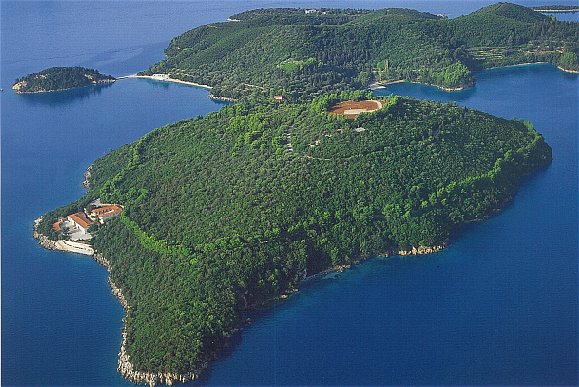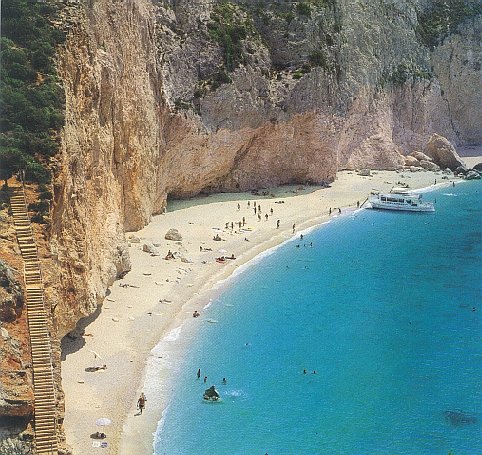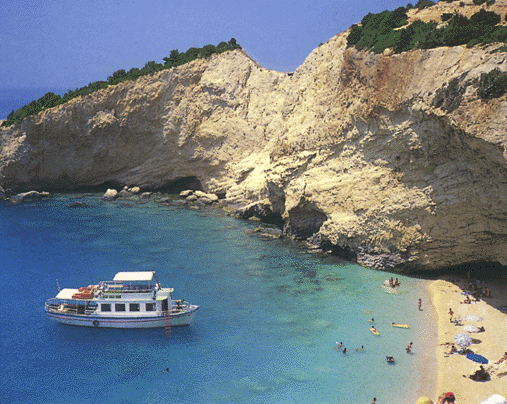|
|
Lefkada Island
 The
remenants of human life in Lefkada are placed in the Neolithic
Era. Its first inhabitants were the Televoans and Lelegians.
Excavation finds at Nidri and elsewhere, led the German
archeologist Wilhelm Darpfeld to the conclusion that Lefkada
is Homer's Ithaca, the homeland of the crafty Odysses.
Darpfeld supported this theory with great passion and
formulated it in his book "Alt Ithaka". He himself
lived a great part of his life on this island and he died ans
was buried there, for that was his wish. The
remenants of human life in Lefkada are placed in the Neolithic
Era. Its first inhabitants were the Televoans and Lelegians.
Excavation finds at Nidri and elsewhere, led the German
archeologist Wilhelm Darpfeld to the conclusion that Lefkada
is Homer's Ithaca, the homeland of the crafty Odysses.
Darpfeld supported this theory with great passion and
formulated it in his book "Alt Ithaka". He himself
lived a great part of his life on this island and he died ans
was buried there, for that was his wish.
The presence of Lefkada during the historic times, has been
great and dynamic. The Corinthians conquered Lefkada in 7th
Century B.C. In the 8th Century B.C., she took part in the
wars against the Persians. During the Peloponesian War, she
was an ally of Sparta and fought against the Athenians and
Thebands. In 197 B.C., the island was conquered by the Romans.
Later on (1204-1293), it formed part of the Kingdom of Epirus.
Afterwards, it came into the possession of Orsini (1293-1331),
who fortified it with a fortress that still exists. Then
successively, it fell into the hands of the Andegavians,
Gratiano Giorgi (1331-1362) and the Toccans (1362-1479). In
1479, it was conquered by the Turks. In 1684, it was taken by
the Venitians, in 1797 by the Republican Frenchmen, in 1799 by
the Russians and Turks, and in 1807 by the imperial Frenchmen.
In 1810, it fell into the hands of the British, and in 1864,
it was united with Greece, together with the rest of tne
lonian islands.
 Cultural Tradition: Lefkada is a
small and poor place. But its cultural tradition is its great
glory. Today Lefkada is the first place in Greece as far as
cultural dynamism is concerned. There are many people from
Lefkada who distinguished themselves in the letters, the arts
and sciences. It is worth mentioning two indicative names of
our letters: our national poets Aristotelis Valaoritis and
Angelos Sikelianos, both of them born and raised in Lefkada.
Cultural Tradition: Lefkada is a
small and poor place. But its cultural tradition is its great
glory. Today Lefkada is the first place in Greece as far as
cultural dynamism is concerned. There are many people from
Lefkada who distinguished themselves in the letters, the arts
and sciences. It is worth mentioning two indicative names of
our letters: our national poets Aristotelis Valaoritis and
Angelos Sikelianos, both of them born and raised in Lefkada.
Quick Tour: There are
many daily transport connections with Athens (400 kilometers
away). One a week, it is connected with Patras by ship and by
air with Athens through Aktion. The beach at Gyra at the
entrance of the island (1200m. from the city) pure white and
endless is one of the most beautiful in Greece and fascinates
the visitor on site. The county of Lefkada includes the
capital of the island, Lefkada or Hora (pop. 7.500
inhabitants), has a well organized business life. In August,
when the well known "Speech and Art Festival" takes
place there, life becomes cosmopitan. There are hotels, but
also rooms can be rented.
 Here are some sights of the town: the Venitian Fort, built in
1300, the Public Library where the Museum of Post-Byzantine
Art is housed, the Museum of Popular Art, the Historic
Archives, many churches with interesting iconostases (reredos)
and icons painted by painters of the seven lonian Islands, the
homes and busts of the poets Valaoritis and Sikelianos. Three
kilometers south-west of the town, is the famous Monastery of
Faneromeni with an excellent view. One kilometer north-east of
the town, at Kalligoni, one finds ruins of Nirikos, ancient
capital of the island. Here are some sights of the town: the Venitian Fort, built in
1300, the Public Library where the Museum of Post-Byzantine
Art is housed, the Museum of Popular Art, the Historic
Archives, many churches with interesting iconostases (reredos)
and icons painted by painters of the seven lonian Islands, the
homes and busts of the poets Valaoritis and Sikelianos. Three
kilometers south-west of the town, is the famous Monastery of
Faneromeni with an excellent view. One kilometer north-east of
the town, at Kalligoni, one finds ruins of Nirikos, ancient
capital of the island.
The road network of the island is good. Touring the
countryside of Lefkada, is a fantastic thing. Those who go
there, let them have in mind the places we mention below:
Liga (4kms. from the town). It is a setlement with a wonderful
sea and fresh fish.
Nikiana (9kms.) It is a seaside settlement. There are
restaurants and rooms are rented there. It has a nice sea for
swimming.
Periyali (15kms). It is a small settlement, a little way
before one reaches Nidri. At the place Passa, near this
settlement, one can ei; v the sea and cool water of spring
with the same name.
Nidri (17kms). It is a seaside village with an organized
tourist substructure. Here Darpfeld, made excavations, looking
for Homers' Ithaca. His bust is here, and opposite, at Aghia
Kiriaki, next to the waves, is his grave. From Nidri, one can
go across to the islands of Scorpios, Madouri, Meganissi etc,
with a small motorboat. Rooms are rented here, and there are
hotels and many restaurants.
 Mikros Yalos
(31 kms) It is a bay and a place below Poros (a picturesque
village with courteous people), a golden beach, camping sites,
restaurants etc.
Mikros Yalos
(31 kms) It is a bay and a place below Poros (a picturesque
village with courteous people), a golden beach, camping sites,
restaurants etc.
Sivota (33kms) It is a fishing village at the bay with the
same name. According to Darpfeld, it was here that Odysses
came ashore after his fifteen year adventure at sea.
Vassiliki (38kms) It is a picturesque village south of the
island with a nice harbor, hotels, restaurants and a very
clear sea for swimming. Using a small motorboat, one can go to
Lefkata from here; it is the legendary cape of Lefkada where,
according to tradition, Sappho committed suicide because of
love. Apollo of Lefkata was worshipped here in antiquity.
Sivros (32 kms) It is a village five kms. to the right of the
circular road (towards Vassiliki). It has plenty of water and
an lush vegetation. There is a small hotel and rooms are
rented here.
Aghios Petros (36 kms) It is the second village in size on the
island, located on the circular road It is also a rich
village. One can easily go down from here to Ponti or
Vassiliki, for swimming. Rooms are rented here.
 Karia (14kms). This is the largest village of Lefkada at the
northern part of the island. It has much water and a wonderful
square, shaded by large plane trees. The excellent and greatly
prized "corsanic" emproidery, is made here.
Karia (14kms). This is the largest village of Lefkada at the
northern part of the island. It has much water and a wonderful
square, shaded by large plane trees. The excellent and greatly
prized "corsanic" emproidery, is made here.
Agios Nikitas (12kms) It is a picturesque fishing village on
the western side of the island. Its beach is the best in the
island.
Other villages that a traveller should have in mind are,
Sfakiotes with the famous "Frquot; well, Drimonas,
Exanthia, Hortata, Atharti etc. |